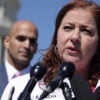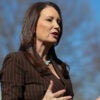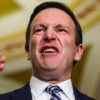Two weeks from now, The Daily Signal’s chief news correspondent, Fred Lucas, will lose his White House press credentials. It’s the latest—and perhaps most brazen—attempt by President Joe Biden to limit media access to what he regularly calls “the People’s House.”
The White House Press Office will implement new rules July 31, when all “hard passes” expire. Lucas, holder of a hard pass since 2009, no longer will be able to easily attend White House press briefings or access the sprawling Pennsylvania Avenue campus—as he has done for the past 14 years.
At issue are new rules, announced in May, that limit the number of journalists who are eligible for a White House hard pass and give Biden’s press team greater power to expel journalists it doesn’t like.
The Daily Signal depends on the support of readers like you. Donate now
The rules require pass holders to first obtain “accreditation by a press gallery in either the U.S. Senate, U.S. House of Representatives, or Supreme Court.” (See the full email from the White House Press Office at the end of this story.)
The Daily Signal, a media outlet founded by The Heritage Foundation in 2014, doesn’t have press credentials to cover Congress or the Supreme Court, although Lucas recently applied for both. It’s unclear when he’ll receive a response and unlikely he’ll be approved, if history is a guide.
The Supreme Court has a limited number of hard-pass holders—just 25 for the past term. Congressional galleries, governed by a committee of journalists, have their own rules.

Limiting Media Access
Lucas isn’t the only reporter who will be left without a hard pass for the White House in two weeks. The White House won’t say exactly how many others will lose access. Officials also won’t disclose the number of hard passes currently in circulation.
Simon Ateba, the White House correspondent for Today News Africa who regularly spars with White House press secretary Karine Jean-Pierre, is among those sounding the alarm.
The new rules stipulate that reporters must work full time for “an organization whose principal business is news dissemination.” But the rules go even further by requiring reporters to act in a “professional manner,” “respecting their colleagues, White House employees, and guests,” and “not impeding events or briefings.”
Ateba frustrates not just Jean-Pierre, who refuses to answer his questions at press briefings, but also other journalists in the James S. Brady Press Briefing Room. Last week, the White House Press Office sent Ateba a warning that he risked expulsion if he continued to interrupt briefings in violation of the new rules.
Others who don’t meet the White House Press Office’s new criteria will simply lose access July 31. That includes The Daily Signal, which is among the most-read conservative news outlets in America, according to Comscore data compiled by The Righting, a media company.
Lucas, who has covered the White House during the presidencies of Barack Obama, Donald Trump, and Biden, has watched both the press office and White House Correspondents’ Association change during his 14 years on the beat.
Previously, Lucas was downgraded from a full member of the White House Correspondents’ Association to an associate member because he didn’t have congressional press credentials. That change, however, didn’t affect his access to the briefing room at the White House.
>>> The Daily Signal Won’t Be Bullied by the Establishment Media
Lucas later came under fire when serving as the “pool reporter” for an event featuring Vice President Mike Pence in 2017.
Although no one complained about the accuracy of Lucas’ reports, The Washington Post’s Paul Farhi questioned whether The Daily Signal was a “legitimate news outlet.” Three years later, in 2020, The New York Times’ Annie Karni wrote a similar story.
‘Unduly Vague’ Rules
Of course, this is hardly the first time the White House and reporters have clashed over media access. During the Trump administration, CNN reporter Jim Acosta and Playboy correspondent Brian Karem were booted from the grounds. They each took their cases to court and eventually won reinstatement.
This time, however, few reporters are standing up in opposition to the new rules. Even the White House Correspondents’ Association “has taken an officially noncommittal stance,” according to The Washington Post.

The Daily Caller reported in May that the WHCA, whose purpose is to fight for access, consulted with the White House Press Office on the new rules.
An unnamed Biden official told the Daily Caller: “As we neared a final decision, we informed White House Correspondents’ Association leadership of our plans and received feedback, as a result of which we made important updates to the policy, like accommodating permalancer and journalists without a residence in D.C.”
Tamara Keith, a White House correspondent for NPR whose term as WHCA president ended Friday, told the Daily Caller at the time: “They told us they were going to do this. We pushed back where we could and did succeed at getting a few small changes. But it very much continues to be their policy and not ours.”
The White House says the new rules will enhance security by limiting access to hard passes. But not everyone is convinced they’ll be successful.
Karem, who was suspended for 30 days in 2019 after a verbal exchange with former Trump aide and current radio host Sebastian Gorka, is among them.
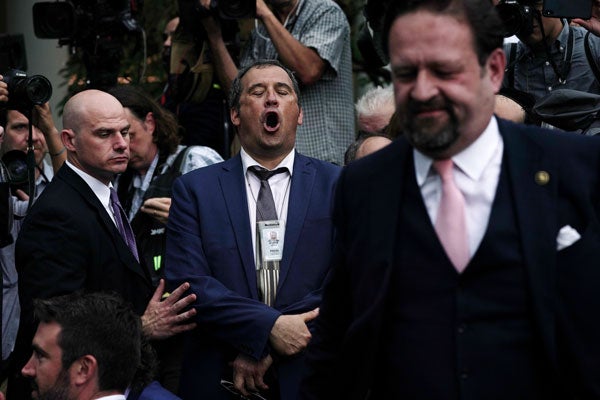
Karem told The Washington Post that “if they’re trying to get rid of a reporter because they don’t like the question or because they think yelling out a question is rude, I’d just refer them to the Acosta and Karem cases. They will lose.”
His lawyer, Ted Boutrous Jr., called the new rules “unduly vague.”
“We fought against the arbitrary suspensions of press passes by the prior administration, which were similarly based on vague standards of conduct that can all too easily be misused to attack and punish aggressive journalism or unpopular viewpoints and shield the White House from rigorous journalistic scrutiny,” Boutrous told the Post.
Biden’s Battles
Since taking office in January 2021, Biden and his press staff have clashed repeatedly with journalists at home and abroad. Just last week, “frustrations boiled over Wednesday in Vilnius, Lithuania, when wranglers and other aides shouted at reporters in an effort to clear the room,” Politico reported.
White House staff didn’t want reporters asking Biden and Ukrainian President Volodymyr Zelenskyy questions, so they shouted over the two principals as reporters were ushered out of the room.
Politico reported in its West Wing Playbook that “members of the pool reconvened outside the meeting and shared their frustration, including with administration officials. Some who spoke with West Wing Playbook described themselves as ‘livid’ and described the yelling over Zelenskyy as ‘unacceptable.’”
Similar situations have played out at the White House, where Biden’s aides are known for a particularly aggressive tone with reporters who don’t abide by their wishes or are flummoxed by Jean-Pierre’s answers.
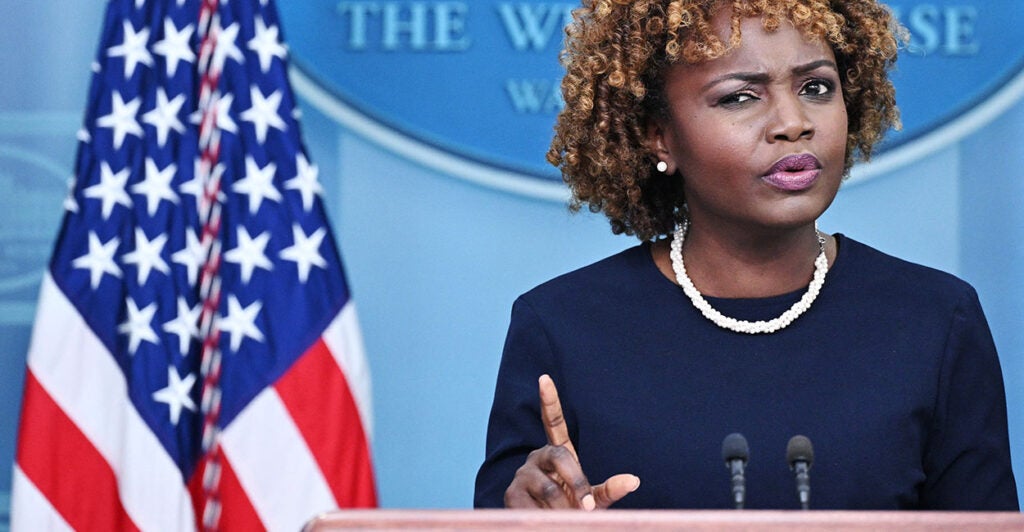
“She is arguably the least effective White House press secretary of the television era,” a longtime White House reporter told CNN’s Oliver Darcy earlier this year.
In his newsletter analyzing the reporters’ frustrations, Darcy wrote: “She has openly struggled to field basic questions inside the briefing room, relying, in agonizing fashion at times, on her binder of talking points to respond to simple inquiries.”
>>> Related: White House Press Secretary Karine Jean-Pierre: Incompetent but Failing Upward
Biden himself has on many occasions voiced his displeasure with reporters. According to a recent Daily Signal article on Biden’s temper, the president has done everything from call a Fox News reporter a “stupid son of a b—” to berating another who asked a question despite not being on a preapproved list.
Biden, who mostly campaigned for the presidency from his basement in Delaware in 2020, has done far fewer press conferences than his predecessors, averaging only 10 per year. Keith, the former WHCA president, cited that lack of access as one of her biggest challenges as a reporter.
“In terms of the relationship between the president and the press, they are not doing a lot of press conferences, and we’ve had to really advocate to get the ones that we’ve gotten, which is quite frustrating,” Keith said in a wide-ranging Deadline interview in April.
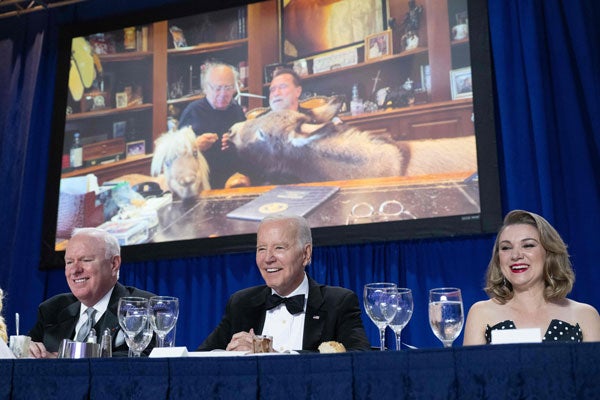
According to the American Presidency Project at the University of California, Santa Barbara, Biden held nine press conferences in 2021, 12 in 2022, and five so far this year. Just one of Biden’s press conferences in 2023 was a solo appearance; the other four were joint appearances with world leaders such as Zelenskyy.
The American Presidency Project maintains statistics dating to 1920. President Calvin Coolidge averaged the most press conferences per year, at nearly 73. Biden currently averages 10 a year. Biden’s recent predecessors—Presidents George W. Bush, Barack Obama, and Donald Trump—averaged twice as many.
With growing questions about Biden’s stamina for the job—even Democrats cite the president’s health as a concern—his lack of press engagement gives the American public fewer opportunities to observe their commander in chief.
***
The following email, dated May 11, was sent by the White House Press Office outlining the new rules for hard-pass holders such as Lucas.
From: White House Press Office
Sent: Thursday, May 11, 2023 3:46 PM
Subject: Notice to All Hard Pass Holders
Dear colleague,
We are writing to inform you that the White House intends to revise the policy on press hard passes to be consistent with that of prior administrations. Under the policy, all current press hard passes will expire on July 31. You will be able to request renewal of your current hard pass as described below, and any renewed passes will remain valid for one year, subject to annual renewal.
To renew your pass, your bureau chief/supervisor will need to email a letter to XXXXX. Your news organization will not need to submit multiple letters if requesting hard passes for more than one employee as long as your letter covers all employees requesting hard pass access to the White House campus.
This letter will need to be written on the official letterhead of your news organization, including contact information for someone who can verify the details provided below, and indicate that each applicant meets the following requirements:
- Full-time employment with an organization whose principal business is news dissemination (If you are freelance, we will need letters from two news organizations describing your affiliation, or, if you freelance primarily for one organization, a letter from that organization describing the extent and duration of your relationship with the organization);
- Physical address (either residential or professional) in the greater Washington, D.C. area;
- Have accessed the White House campus at least once during the prior six months for work, or have proof of employment within the last three months to cover the White House;
- Assignment to cover (or provide technical support in covering) the White House on a regular basis;
- Accreditation by a press gallery in either the U.S. Senate, U.S. House of Representatives, or Supreme Court; and
- Willingness to submit to any necessary investigation by the U.S. Secret Service to determine eligibility for access to the White House complex, where Secret Service will determine eligibility based on whether the applicant presents a potential risk to the safety or security of the President, the Vice President, or the White House complex.
This letter should be attached, along with a photograph or scan of a Senate, House of Representatives, or Supreme Court credential, and the completed hard pass application and submitted at one time to XXXXX.
After receiving the letter from your supervisor and updating your background check, the U.S. Secret Service will grant a hard pass upon confirmation from the Press Office that you meet the above criteria. You will not need to receive a new physical pass if you already have one.
If you currently do not have a hard pass, you will need to complete the standard application and also provide the letter stated above. The Press Office will then be in touch to schedule a time to pick up your hard pass if approved.
The White House expects that all hard pass holders will act in a professional manner while on White House grounds by respecting their colleagues, White House employees, and guests; observing stated restrictions on access to areas of the White House or credentialed events; and not impeding events or briefings on campus. Absent security concerns involving the United States Secret Service or other exigent circumstances, the White House will provide a written warning to you if your conduct violates these expectations. Subsequent violations may lead to the suspension or revocation of your hard pass, following notice and an opportunity to respond.
If you have comments or questions regarding this proposed policy, please submit them to XXXXX no later than May 15.
Please let us know if you have any questions.
Sincerely,
The White House Press Office

